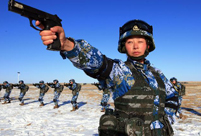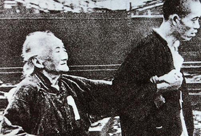 Martenitsa adds glamour to Bulgarian Embassy
Martenitsa adds glamour to Bulgarian Embassy
 Mysterious 'Dolan Tribe' in Xinjiang
Mysterious 'Dolan Tribe' in Xinjiang
 This is Shanghai
This is Shanghai
 Female attendants serving 'two sessions'
Female attendants serving 'two sessions'
 The many tears of DiCaprio
The many tears of DiCaprio
 Dan Dan's bittersweet opera life
Dan Dan's bittersweet opera life
 A dream wedding for a girl suffering from cancer
A dream wedding for a girl suffering from cancer
 Old photos of Anti-Japanese War (1937-1945)
Old photos of Anti-Japanese War (1937-1945)
 This is Beijing – Nanluoguxiang
This is Beijing – Nanluoguxiang
POLITICAL COMMUNICATION IN NEW MEDIA ERA
During the two sessions this year, the central Chinese government reached out to the public through its WeChat account and forwarded news twice a day.
The account forwarded highlights of Premiere Li Keqiang's government work report as observed by different parties such as deputies, officials and the media, as well as authoritative interpretations and data analysis. Articles such as "Understanding Government Work Report in 50 Sentences" and "Big Data Perspective on Two Sessions" were widely reposted.
Interconnectedness, the single most outstanding characteristic of mobile Internet, places pressure on government departments to change their management, said Shao.
"Mobile Internet has pushed forward disclosure of government affairs," said Shen Yang, professor at Wuhan University with Internet as his area of research.
He said information disclosure will clear up misunderstandings between the government and the public, and help with anti-corruption campaigning.
Lei Jun, NPC deputy and founder of the well-known Xiaomi Tech, said Internet thinking is similar to the CPC's ongoing campaign of adopting a mass line to strengthen ties with the public -- "from the masses, to the masses."
The country's leadership has attached great importance to Internet thinking.
In a piece of graphic news named "Where Did President Xi's Time Go," Xi Jinping appeared in a cartoon image wearing gray jacket and blue trousers, and explaining that his time was devoted to international trips, conferences and grassroot research.
The feature was posted on qianlong.com, a website run by the publicity department of Beijing Municipal Government and was a great success. Internet users praised Xi's posture as a man of people.
"The public now has access to the once mysterious process of political decision making. It represents ideological emancipation and a technological advance," said Chang Jiang, professor at the School of Journalism and Communication at Renmin University.
RESHAPING CHINA
"Internet will change China, making the country much stronger," said Robin Li, CEO of Nasdaq-listed Baidu, China's No. 1 online search company.
He attended a CPPCC National Committee press conference as one of the speakers, the first time Chinese Internet business leaders have been speakers at the annual session; Tencent CEO Ma Huateng, Lei Jun, Robin Li, and Shanda Interactive's Chen Tianqiao were all present.
"Young technical elites will have a greater say in political affairs because they are proficient in mobile Internet technology," said Chang, who believes more younger people will become political participants.
He added that mobile Internet has become the major battlefield for public opinion, meaning the government faces more intense challenges than ever before.
Shao Zhiqing thinks government at all levels should realize scientific and democratic decision-making by utilizing big data.
But Internet anarchists including hackers and users who spread false information should be severely punished, said many lawmakers at the sessions.
Experts say making use of mobile Internet in the international political arena is a new task for China as international organizations such as embassies of foreign countries in China have created their own Weibo and WeChat accounts.
"Now that foreign countries have access to public opinion domain in China, they will influence it for sure," Shen Yang said.

 Chaihe village, pure and peaceful fairyland in snow
Chaihe village, pure and peaceful fairyland in snow Belgians warmly welcome arrival of China's giant pandas
Belgians warmly welcome arrival of China's giant pandas Female marines receive tactical training in NW China
Female marines receive tactical training in NW China Blood memory: Nanjing Massacre in 1937
Blood memory: Nanjing Massacre in 1937 Top 10 pure beauties in showbiz
Top 10 pure beauties in showbiz British WWII veteran: I can't forgive Japan
British WWII veteran: I can't forgive Japan Tongban's dream of prosperity
Tongban's dream of prosperity Chinese frigate Yancheng holds drills in Mediterranean Sea
Chinese frigate Yancheng holds drills in Mediterranean Sea A visit to comfort woman's home in South Korea
A visit to comfort woman's home in South Korea Fairyland? Qingdao in sea of clouds
Fairyland? Qingdao in sea of clouds Top 10 most handsome faces in Asia in 2013
Top 10 most handsome faces in Asia in 2013 Female celebs with beautiful long legs
Female celebs with beautiful long legs Cat 'guardians' in Forbidden City
Cat 'guardians' in Forbidden City Large numbers of ancient coins excavated in Inner Mongolia
Large numbers of ancient coins excavated in Inner Mongolia Leisurely life beneath Zhonggulou, where time travels slower
Leisurely life beneath Zhonggulou, where time travels slowerDay|Week|Month